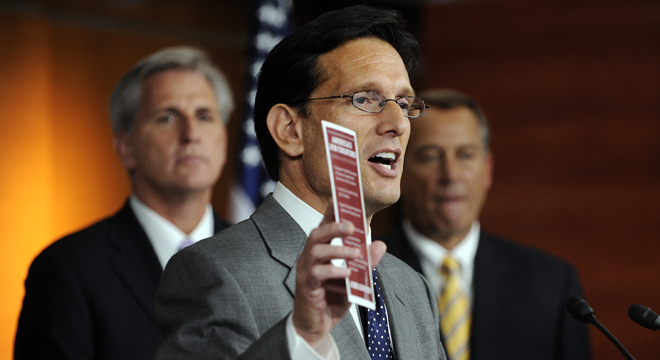At a briefing with a handful of reporters in his Capitol suite Monday afternoon, House Majority Leader Eric Cantor outlined the coming year on Capitol Hill — one he said would be marked by increased oversight of the Obama administration; an ongoing debate between the parties about how best to grow the economy; and what he called a bipartisan effort to prevent automatic cuts to defense spending from kicking in at the end of the year.
But the two issues that have most divided the parties since President Obama took office — the two most consequential pieces of the budget and the U.S. economy — will most likely be decided by the election.
“The two issues surrounding tax reform and health care that have eluded any solution over the last year…you go back to the Biden talks, the White House talks, or the Super Committee — three times, no resolution,” Cantor said. “I think that ought to tell you something.”
The first year of the GOP majority was marked by Republicans cornering Democrats into a debate about the size of government, with Republicans arguing that the country’s fiscal trajectory should be rectified by dramatically scaling back programs like Medicare, and Democrats countering that addressing long-term budget deficits would require comparable levels of new tax revenues and program cuts.
This year will differ from 2011 in that Republicans won’t have nearly as many opportunities to use must-pass legislative items as leverage to make inroads in that fight — so resolving it will have to wait.
“It goes back to what the President said,” Cantor noted, “there’s some big issues that’ll need to be decided by the election.”
That presages an extremely busy, far-reaching lame-duck session of Congress in November and December. At the end of the year a giant austerity bomb is timed to detonate — the Bush tax cuts will expire; the automatic cuts to defense and non-defense spending will kick in as a consequence of the Super Committee’s failure; and, assuming it’s extended through the end of the year; the payroll tax holiday will come to an end. Preventing those things from happening simultaneously will likely require broad consensus between the parties on an alternative package of budget cuts and tax reforms, but that consensus will be forged by the election results. In the meantime, members and their staffs can lay ground work for a variety of potential outcomes in November, but Cantor’s remarks suggest that a broad agreement won’t come earlier than the end of the year.










